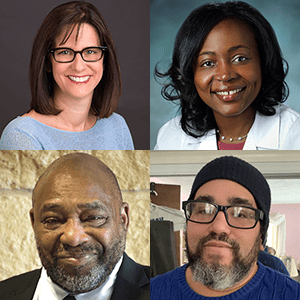January 19, 2021
As the COVID-19 vaccine becomes publicly available across the country and the world, we are each faced with making the choice about taking the vaccine for ourselves and/or our loved ones. In addition to the concerns that the general public may have, NAMI recognizes the complex history of distrust, discrimination and access challenges for many people who also experience mental illness.
In this webinar, NAMI brings together experts from diverse specialty areas for a panel presentation and facilitated Q&A focused on the evolving science of vaccines, barriers to access, and the presence of medical skepticism in marginalized communities. Moderator and NAMI Chief Medical Officer Dr. Ken Duckworth will be joined by a panel of experts, including:
Each panelist will provide an overview of their area of expertise, after which Dr. Duckworth will moderate a Q&A session. This session will be recorded and posted to our website within 1-2 days of the webinar ending. A typed transcription of the audio will also be provided within 1 week of the webinar ending.
Gail Daumit, MD, MHS, FACP
Dr. Gail Daumit is the Samsung Professor of Medicine in the Division of General Internal Medicine at the Johns Hopkins University School of Medicine and Vice Chair for Clinical and Translational Research in the Department of Medicine. She is the director of Johns Hopkins NIMH ALACRITY Center for Health and Longevity in Mental Illness, as well as a practicing general internist, epidemiologist and mental health services researcher whose work is devoted to improving physical health and decreasing premature mortality for people living with serious mental illnesses. Her current projects — the ALACRITY Center and a newly-funded NIH project named DECIPHeR — focus on testing implementation strategies to scale up evidence-based interventions to decrease cardiovascular risk for people with serious mental illness in community mental health settings. Dr. Daumit’s clinical trial of a behavioral weight loss intervention for persons with serious mental illness, the ACHIEVE trial, was the first long-term clinical trial to demonstrate that a behavioral weight loss intervention was successful in persons with serious mental illness.
Oluwaseun Falade-Nwulia, MBBS, MPH
Dr. Oluwaseun Falade-Nwulia is an Associate Professor in the Division of Infectious Diseases at the Johns Hopkins University School of Medicine. Her research has focused on development of models of linkage to and provision of HIV, hepatitis C virus (HCV), other infectious disease, substance use and mental health disorder care services to people with or at risk of HIV and hepatitis infections. She currently serves as the PI on a Substance Abuse and Mental Health Services Administration grant, which is focused on expanding access to substance use and co-occurring mental health disorder treatment for patients accessing infectious diseases care at the Johns Hopkins John G. Bartlett Specialty Infectious Disease clinic. She previously served as Medical Director of the Baltimore City Health Department (BCHD) Ryan White funded HIV programs and designed and implemented the BCHD HCV testing, linkage to care and treatment programs. She is also an active HIV, HCV and substance use disorder treatment provider.
William B. Lawson, M.D., Ph.D., D.L F.A.P.A.
Dr. William B. Lawson is the founder and director of the Institute to Reduce Disparities LLC, Director of Psychiatric Research for the Emerson Clinical Research Institute, and Adjunct Professor of Psychiatry at the University of Maryland School of Medicine. He is emeritus professor of psychiatry at the Dell Medical School, University of Texas, Austin, and emeritus professor and former chair of Psychiatry and Behavioral Sciences at Howard University School of Medicine. He has held numerous senior positions including past president of the DC chapter of Mental Health America, past president of the Washington Psychiatric Society, past chair of the Section of Psychiatry and Behavioral Sciences of the National Medical Association, and past president of the Black Psychiatrists of America. He has over 200 publications, and is the editor-in-chief of the Journal of the National Medical Association. He has continuously received federal, industry, and foundation funding to address mental and substance abuse disparities.
Jeremiah Rainville, CCHW, CPRS, CCSP, CAMHFA
Jeremiah Rainville is a 35-year-old peer living with a mental health condition and the National Chair of NAMI’s Peer Leadership Council. For nearly a decade, Rainville has worked at NAMI Rhode Island in many different roles, most recently serving for three years as Peer Program Manager. Alongside the staff and volunteers of the peer department at NAMI Rhode Island, he works to foster cohesion and teamwork across peer communities as they pursue better outcomes for the mental health community. Rainville holds certifications as a Community Health Worker, Peer Recovery Specialist, Community Support Professional, and as a Certified Adult Mental Health First Aider. He is also certified as a State NAMI Connection Recovery Support Group Facilitator Trainer and a NAMI Peer-to-Peer Leader. As chair of the NAMI National Peer Leadership Council, Rainville works to serve Rhode Island while partnering directly with Peer communities to ensure they are heard at board meetings, committee meetings, and on the CEO Taskforce.
NAMI Ask the Expert is an informational webinar series and is not intended to provide medical advice on any specific topic or for any specific individual. The series is made possible through the generous support of people like you. If you're enjoying this free program, please consider donating at NAMI.org/donate.
For questions or troubleshooting, contact us at [email protected].
NAMI HelpLine is available M-F, 10 a.m. – 10 p.m. ET. Call 800-950-6264,
text “helpline” to 62640, or chat online. In a crisis, call or text 988 (24/7).